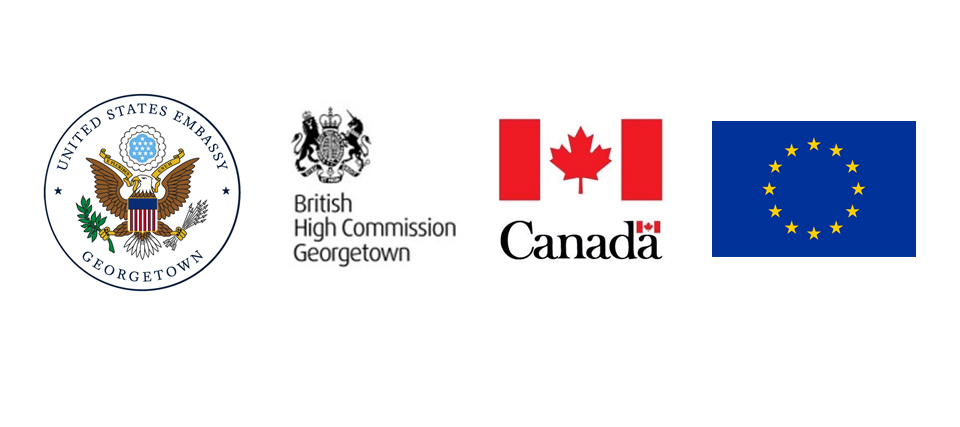The media’s role in enabling transparency in the management of Guyana’s resources during a time of rapid growth has been highlighted by the envoys of the United States, the United Kingdom, Canada and the European Union who also called for the Access to Information Act to be effectively implemented.
In a statement to mark World Press Freedom Day (WPFD) today, US Ambassador Sarah-Ann Lynch, UK High Commissioner Jane Lynch, Canadian High Commissioner Mark Berman and EU Ambassador René Van Nes lauded the work of the media and highlighted the role that it can play in relation to transparency in the management of Guyana’s resources.
“In addition to providing access to facts and information, media freedom allows for transparency and accountability, important components for Guyana’s management of resources during a time of rapid growth”, the envoys said. The mentioning of resources and rapid growth would be seen as a reference to Guyana’s burgeoning oil and gas sector.
Noting that this year marked the 30th anniversary of WPFD, they said: “it brings us to a point of reflection on the state of media freedom in Guyana after 30 years. As we reflect on this year’s theme, we recognise and acknowledge that media freedom is deeply imbedded within the freedom of expression and all other human rights.
“The media plays a pivotal role in society by disseminating facts for public consumption and helping citizens in Guyana stay informed, establish opinions, make informed choices, and participate meaningfully in society. The availability of facts and information is fundamental to exercising such rights as access to health, education, justice, and to fighting against gender and economic inequalities. The media’s charge to responsibly deliver the facts fairly and without bias to all people, benefits all of society”, the statement said.
The Heads of missions urged all stakeholders including the government and the opposition to maintain mutually respectful relations with the media.
“It is imperative that all stakeholders, including decisions makers such as the government and the opposition, maintain a mutually respectful relationship with the media in its capacity as the fourth estate and as a vital part of democracy in action. This means granting the media access to public officials and to information should be the norm. Requests for public information should be honored. The 2013 Access to Information Act should be effectively implemented to empower the media to do their job”, the diplomats said.
Several editorials in this newspaper have criticised the government over the non-functioning of the Access to Information Act.
The envoys added that media workers should not be fettered nor have to work under unnecessary duress or risk to their safety in order to have access to information.
“They should not face abuse, threats, intimidation or personal attacks in the execution of their duties, nor should they be expected to align with any specific idea, person, entity or political party, whether directly or anonymously. The media’s role is to provide objective and impartial reporting, which is essential to maintaining a healthy democracy and ensuring that all voices are heard. Therefore, it is important that employees of the media are protected and are able to carry out their duties without fear”, the diplomats said.
Recently a member of the main opposition was accused of using profane language to a reporter and two other reporters came under attack from a social media page known to be close to the government.
The envoys also inveighed against the practice of selectiveness in granting access to information or to public officials under the guise of media bias.
“As we reflect on the past thirty years of advocacy for media freedom, we recognise that despite how far we have come, work remains. Together we must continue to develop the role that the media plays in promoting democracy, transparency and accountability and work collectively to understand the expectations of all stakeholders.
“We therefore call on the media, Government, Opposition, and all stakeholders to recognise the roles and responsibilities of the media and its benefits to the people of Guyana. We thank all journalists for their hard work, sacrifice and service to society, and we urge all stakeholders to continue supporting media freedom and promoting a culture of open and honest communications in Guyana”, the envoys added.









